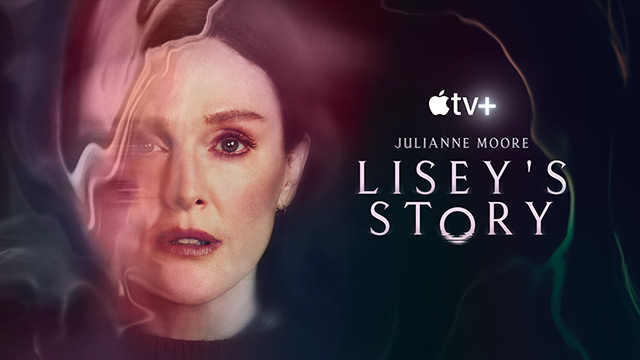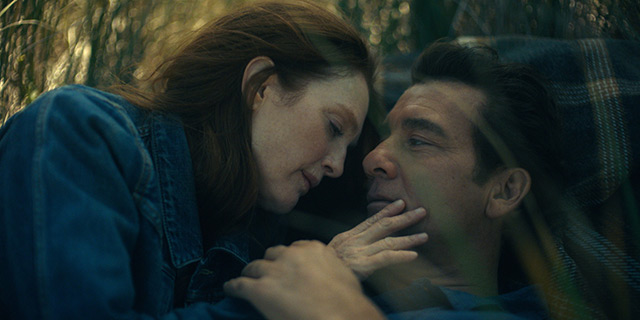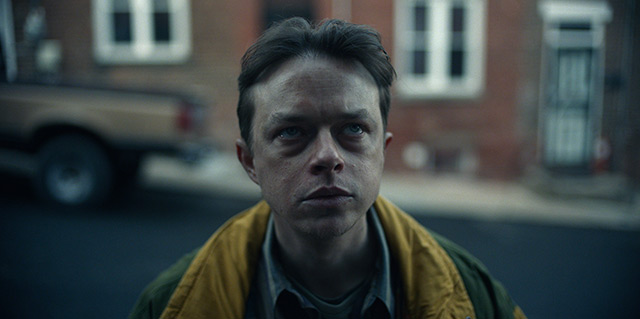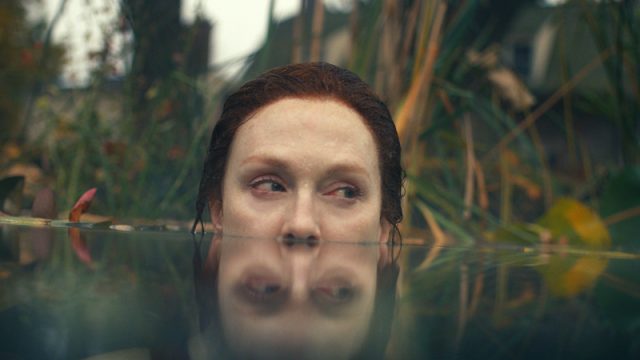Apple TV+ released its Stephen King series adaptation Lisey’s Story on June 4. ComingSoon’s Jeff Ames got the chance to talk with the series’ composer Clark (aka Chris Clark), who discussed everything from his views on classical music and his ventures into the world of sound design. You can check out ComingSoon’s interview with the composer below!
RELATED: Lisey’s Story Trailer: Julianne Moore Leads Apple’s Stephen King Series
Based on Stephen King’s 2006 novel, Lisey’s Story is a deeply personal, pensive thriller that following the story of Lisey Landon two years after the death of her husband, a famous novelist named Scott Landon. A series of unsettling events causes Lisey to face memories of her marriage to Scott that she has deliberately blocked out of her mind.
The series reunites Oscar winner Julianne Moore and Oscar nominee Clive Owen, who previously worked together in 2006’s action-thriller pic Children of Men. Joining them are Joan Allen (Nixon), Jennifer Jason Leigh (Atypical), Dane DeHaan (ZeroZeroZero), Ron Cephas Jones (This Is Us), and Sung Kang (Fast & Furious films).
The story was actually inspired by King’s own experience when he was involved in a serious accident in June 1999. The idea for the novel sprang from a sudden realization he had when he came home from the hospital and saw that all of his belongings were in boxes. Because of that, he saw a vision of what his studio would look like after his death.
RELATED: Lisey’s Story Featurette: Stephen King Talks Personal Connection to Story
Lisey’s Story is executive produced and directed by Pablo Larraín from a script written by Stephen King. It is produced by J.J. Abrams’s Bad Robot Television and Warner Bros. Television, with Abrams, King, Moore, Ben Stephenson, and Juan de Dios Larraín set as executive producers.

Jeff Ames: Was it always your intention to venture into the world of film and TV scoring?
Clark: Not really. It actually kind of started as a hobby because I just enjoyed putting music to picture. I just got into it kind of accidentally about eight years ago with this show called The Last Panthers. It was kind of 50% accidental, like all the best things in life. Underneath that, there was a feeling that it was really exciting to work with directors and to turn your music into this kind of three-dimensional entity that needed to work around specific scenes. And it just gave me a really good opportunity to learn composition and learn the sort of foundational structures of music. You don’t really get that opportunity if you’re just like playing techno. I’ve always been interested in harmony, but I wanted to kind of get underneath it more and explore recording acoustic instruments and scoring is just the perfect vehicle for that.
What were some of the challenges presented by your early ventures into this new area of music?
The world of electronic music is amazing and I’m never going to jettison my roots, but it can sometimes feel a bit like playing tennis without a net. There’s so much freedom and you actually — under pressure and under a certain narrow set of parameters — you get to really understand what your craft is and you get to hone it. But I’m hungry for challenge permanently. Every project is like a leap forward and I don’t just like releasing music for the sake of it. Every project needs to signal progression.
I’m not in people’s faces with social media, but my music is very much — I’m very prolific and I hope it’s clear that over the last six years, each album I’ve done is a clear signal of progression and that just has to continue, really. And so, in some ways, it’s just practical for me to score films because I write so much music. I’m just not fit for a pure studio album career. It doesn’t work because I write about four albums a year. Scoring to me is like a perfect opportunity to get my music out there and work with people that I enjoy working with.
What draws you to a project like Lisey’s Story?
Well, it’s kind of hard to say no. I mean, I’m a big Stephen King fan. Pablo [Larrain] seemed like a really chill guy and fun to work with. I love the cast and it was hard to turn down. Particularly the cinematography on this one —it made me kind of hallucinate the score because it’s so vivid and there’s so much to work with. I just kind of internalized the world and built this accompanying sound world. It was just a real thrill to work on this one. All the things I’ve scored have been good in different ways, but particularly this — just because of the resources we had — we had access to play at the Abbey Road and had access to AIR Studios in London. I just didn’t feel limited at all in terms of what I could use to record the music.

Was it this wild imagery that pushed you towards a more classical approach for the score?
Good question. I don’t know. It’s a funny thing, string instruments, because they just work the picture, but part of me thinks do they just work because people think they work and it’s this sort of self-reinforcing thing where we just think an orchestra needs to be the thing that you hear when you watch a classic film. I think we’ve been programmed to think that, and I think it’s kind of 60% objectively true, but I think some of the time strings just don’t work, but we think they do because there’s so much orchestral music out there. So, I never come at an orchestra from this sort of snobby perspective, that it’s the real music and the electronic music isn’t real, and the highest we can ever achieve is orchestra. There’s so much prestige in using orchestra, and that is amazing.
However, I also think sometimes it’s not necessary. Sometimes you can achieve just as much with a synth, actually more; and it says more. So, I’m one of those hybrid composers. I kind of find myself — when people are really sticking up for classical music — I kind of want to defend electronic music. And then when people defend electronic music, I go, yeah, but orchestras are really good. I’m never one or the other. In terms of a solo, if you’re releasing an album that needs clear marketing, then that’s not so good. Like people expect all the boxes to be ticked — this is a Metallica album, we expect distorted guitars and drums. As a composer for film, you need to be able to be versatile. So, I really feel like I found my niche because I can sort of inhabit both of these worlds pretty convincingly. And I would say that sort of gradually coming clear and I think that’s why I enjoy working on film.
Is there a trick to scoring horror films or shows like Lisey’s Story?
Yeah, I think its resources and being more confident with orchestra. When I recorded Daniel isn’t Real it was the first time I’d ever recorded strings and those tracks on the album are the ones that worked. There were a few that were just like really sort of gleefully naive experiments that I had to jettison. And then Lisey’s Story is like the third or fourth time I’ve worked with an orchestra. So, I just felt way more confident and happier with it knowing what I wanted from it — it’s sort of a learning process. Last Panthers was purely electronic and a bit of piano. It’s a bit more lo-fi, which is what the director was after; and also my own electronic music.
Where did you start with Lisey’s Story?
It was really her, it was Lisey and her interior state and watching how she moves through the world in this kind of numb, grieving, beautifully, elegant way; and a bit of — you really have to kind of become the character in a way and imagine what they’re feeling. It’s almost like acting. You’re like an invisible actor. All you’ve got is a synth and an orchestra to act with. It always comes from an emotional space. The horror stuff, for want of a better word, you do have to follow certain tropes. Horror just seems to be like, you just get to do the most incredible sound design. Just make the most mental noise you possibly can and put as much effort into it, as long as it’s scary and it comes in at the right point. I’ve been doing that since I was 16. So, that stuff’s easier.
The hardest thing to crack was character and also themes and emotional, memorable interacting parts that conjure up the character; and that’s definitely the harder part. That’s what I always start with. If you can get what the director wants within a few things, then the rest is kind of easy kind of. Or, maybe not easy, but it’s a relief. getting those themes down is just such a relief because then you feel like — although you’ve got a mountain of work ahead of you — you can see the parameter of the mountain. You kind of know where you’re going. You’ve got a bit of a map. It’s not easy, but you’ve got a map at least.

You also helped with the sound design for some of the elements on the show …
Sound design is crucial to everything really. It’s one of the pleasures of being a modern composer. I was walking the other day and these birds took off and their wings had to flap so intensely that it sounded like sub-base. I was thinking, there’s no way a composer from the 19th century would probably have a language for that kind of detailed sonic representation. It’s a very modern thing, and it’s something of our age. I think we’ll look back and think, yeah, that was the time of sound design where emotion was not just scales and keys and chords and acoustic instruments; but rather textures and how that can envelop you when you’re watching a picture. It’s a really massive part of what I do. I want to get involved in Foley, but I’m usually not allowed because I’m not an expert in that.
And on that same point, you helped create the voice of the Long Boy Monster. Where did that sound come from?
Pablo knew he wanted demonic sounds of humans in pain. (Laughs) I thought that would work as well. I mean, it’s quite literal, but we didn’t want it to be too monstery, because that’s actually less scary than, like — if you think what is terrifying or what gets to you, like the sound of a small boy crying, or a small boy making a kind of satanic noise is actually way scarier than like a lion’s roar because you recognize the humanity in it. And because of that, you recognize something of yourself in it. It’s a subtle thing. We didn’t want it to be too special effects-y and artificial. It needed to be believably human, and that’s why recording this 30-piece choir just doing all manner of depraved noises was the way forward.
The other thing that I’ve noticed is the link you can make between horror and beauty and ugliness and appeal — like, one saying sounds terrifying and dark, but we recorded it with the best mics in the world. So, it’s this strange cognitive dissonance of ugliness but captured in the most Hi-Fi way. It’s a really weird combination. It’s like, let’s just get this really horrible thing, but just make it sound fucking amazing! It’s my favorite kind of combination of sort of depravity with expensive taste.










